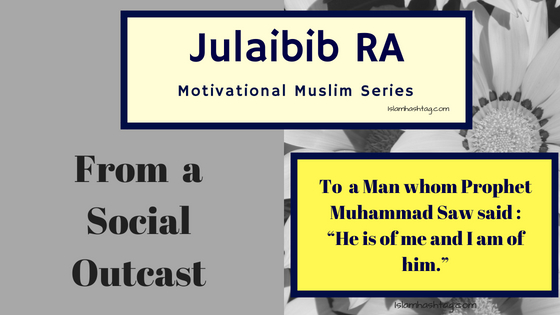A Beautiful story of Julaybib RA
In Julaybib RA, there is the example of a person who was almost regarded as a social outcast because of his appearance. Given help, confidence and encouragement by the noble Prophet, he was able to perform acts of courage and make the supreme sacrifice and deserve the commendation of the Prophet: “He is of me and I am of him.” It is narrated in the Books of History that Julay’beeb رضي الله عنهم was a Sahabee (companion) who was: • short in height • deformed in appearance • his lineage was not known • no one knew who his parents were • with no clan to protect him • no tribe willing to accept him as their own • he cut a lonely figure even the small children of Madinah would tease & mock him • owing to his disabilities no one would allow him to sit in their company.Julaybib RA was one of the less known companions of Muhammad SAW in the early Muslim community. His name was acquired prior to his acceptance of Islam and is considered unusual and incomplete. In the Arabic language Julaybib means “small grown” being the diminutive form of the word jalbab, indicating that Julaybib was small and short, even dwarf-like. He was also described as being damim, meaning ugly, deformed, or repulsive.He survived as best he could in the lonely night in Madinah. He spent wondering the streets in despair, tears of desperation would run down his cheeks, there was no one willing to offer him love or compassion, he had no family and not a single friend in the world.Life for him was a lonely struggle.The disabilities under which Julaybib RA lived would have been enough to have him ridiculed and shunned in any society and in fact he was prohibited by one person, a certain Abu Barzah of the Aslam tribe, from entering his home. He once told his wife: “Do not let Julaybib enter among you. If he does, I shall certainly do (something terrible to him).”After the arrival of the Prophet of ALLAH SAW to Madinah,he used to go and sit in the company of the Prophet SAW and listen intently, rarely speaking .He would out of shyness keep his gaze lowered. He now, had the best of friends in the Prophet of Allah Muhammad SAW .One day as he was sitting in the Company of the Prophet ﷺ, The Messenger of ALLAH ﷺ asked him:“O Julay’beeb رضي الله عنهم ask for something… is there anything you desire?” He raised his head slowly and said in a shy voice; “O Messenger of ALLAH ﷺ, ALLAH has blessed me with your companionship, I get to sit at your blessed feet and hear your blessed words, what more could I desire”.Just as he was aware of the great issues of life and destiny, the Prophet of Mercy (Sallalaahu Alaihi wa Sallam) was also aware of the needs and sensibilities of his most humble companions. With Julaybib in mind, the Prophet (Sallalaahu Alaihi wa Sallam) went to one of the Ansar and said: “I want to have your daughter married.” “How wonderful and blessed, O Messenger of Allah and what a delight to the eye (this would be),” replied the Ansari man with obvious joy and happiness. “I do not want her for myself,” added the Prophet (Sallalaahu Alaihi wa Sallam). “Then for whom, O Messenger of Allah?” asked the man, obviously somewhat let down. “For Julaybib,” said the Prophet. The Ansari must have been too shocked to give his own reaction and he merely said: “I will consult with her mother.” And off he went to his wife. “The Messenger of Allah, may Allah bless him and grant him peace, wants to have your daughter married,” he said to her. She too was thrilled. “What a wonderful idea and what a delight to the eye (this would be),” she said. “He does not want to marry her himself but he wants to marry her to Julaybib,” he added. She was flabbergasted.“To Julaybib! No, never to Julaybib! No, by Allah, we shall not marry (her) to him,” she protested. As the Ansari was about to return to the Prophet (Sallalaahu Alaihi wa Sallam) to inform him of what his wife had said, the daughter who had heard her mother’s protestations, asked: “Who has asked you to marry me?” Her mother told her of the Prophet’s request for her hand in marriage to Julaybib. When she heard that the request had come from the Prophet (Sallalaahu Alaihi wa Sallam) and that her mother was absolutely opposed to the idea, she was greatly perturbed and said: “Do you refuse the request of the Messenger of Allah? Send me to him for he shall certainly not bring ruin to me.” This was the reply of a truly great person who had a clear understanding of what was required of her as a Muslim. What greater satisfaction and fulfillment can a Muslim find than in responding willingly to the requests and commands of the Messenger of Allah! No doubt, this companion of the Prophet, whose name we do not even know had heard the verse of the Quran:“It is not for a believer, man or woman, when Allah and His Messenger have decreed a matter that they should have any option in their decision. And whoever disobeys Allah and His Messenger, he has indeed strayed in a plain error.” (The Qur’an, Surah al-Ahzab, 33:36)This verse was revealed in connection with the marriage of Zaynab bint Jahsh and Zayd ibn al-Harithah which was arranged by the Prophet (Sallalaahu Alaihi wa Sallam) to show the egalitarian spirit of Islam. Zaynab at first was highly offended at the thought of marrying Zayd a former slave and refused to do so. The Prophet prevailed upon them both and they were married. The marriage however ended in divorce and Zaynab was eventually married to the Prophet (Sallalaahu Alaihi wa Sallam) himself. It is said that the Ansari girl read the verse to her parents and said: “I am satisfied and submit myself to whatever the Messenger of Allah deems good for me.” The Prophet (Sallalaahu Alaihi wa Sallam) heard of her reaction and prayed for her: “O Lord, bestow good on her in abundance and make not her life one of toil and trouble.” Among the Ansaar, it is said that there was not a more eligible bride than she. She was married by the Prophet to Julaybib and they lived together until he was killed.And how was Julaybib killed? He went on an expedition with the Prophet (Sallalaahu Alaihi wa Sallam), peace be upon him, and an encounter with some mushrikin (polytheists) ensued. When the battle was over, the Prophet (Sallalaahu Alaihi wa Sallam) asked his companions: “Have you lost anyone?” They replied giving the names of their relatives or close friends who were killed. He put the same questions to other companions and they also named the ones they had lost in the battle. Another group answered that they had lost no close relatives whereupon the Prophet (Sallalaahu Alaihi wa Sallam) said: “But I have lost Julaybib. Search for him in the battlefield.” They searched and found him beside seven mushrikin whom he had struck before meeting his end. The Prophet (Sallalaahu Alaihi wa Sallam) stood up and went to the spot where Julaybib, his short and deformed companion, lay. He stood over him and said: “He killed seven and then was killed? This (man) is of me and I am of him.” He repeated this two or three times. The Prophet (Sallalaahu Alaihi wa Sallam) then took him in his arms and it is said that he had no better bed besides the forearms of the Messenger of Allah. The Prophet (Sallalaahu Alaihi wa Sallam) then dug for him a grave and himself placed him in it. He did not wash him for martyrs and not washed before burial.Julaybib and his wife are not usually among the Companions of the Prophet whose deeds are sung and whose exploits are recounted with reverence and admiration as they should be. But in the meagre facts that are known about them and which have here been recounted we see how humble human beings were given hope and dignity by the Prophet (Sallalaahu Alaihi wa Sallam) where once they was only despair and self-debasement. The attitude of the unknown and unnamed Ansari girl who readily agreed to be the wife of a physically unattractive man was an attitude which reflected a profound understanding of Islam. It reflected on her path the effacement of personal desires and preferences even when she could have counted on the support of her parents. It reflected on her part a total disregard for social pressures. It reflected above all a ready and implicit confidence in the wisdom and authority of the Prophet (Sallalaahu Alaihi wa Sallam) in submitting herself to whatever he deemed good. This is the attitude of the true believer.Sahih Muslim Book 031, Number 6045:Abu Barza reported that Allah’s Apostle (may peace be upon him) was there in a battlefield that Allah conferred upon him the spoils of war. He said to his Companions: Is anyone missing amongst you? They said: So and so and so. He again said: Is there anyone missing amongst you? They said: So and so and so. He then said: Is there anyone missing amongst you? They said: No. Thereupon he (the Holy Prophet) said: But I am missing Julaibib. They (his Companions) searched him amongst those who had been killed and they found him by the side of seven (dead bodies) whom he had killed and he had been killed (by the oppoments). Allah’s Apostle (may peace be upon him) came there and stood (by his side) and said: He killed seven (persons). Then (his opponents) killed him. He is mine and I am his. He then placed him upon his hands and there was none else to lift but Allah’s Apostle (may peace be upon him). Then the grave was dug for him and he was placed in the grave and no mention is made of a bath.—————-The following is from Tafseer Ibn Kathir
- Surah Al-Ahzab
Reflection from the Story of Julayib RA
Wife of Julayib RA : The attitude of the unknown and unnamed Ansari girl who readily agreed to be the wife of a physically unattractive man was an attitude which reflected a profound understanding of Islam. It reflected on her part the effacement of personal desires and prefe rences even when she could have counted on the support of her parents. It reflected on her part a total disregard for social pressures. It reflected above all a ready and implicit confidence in the wisdom and authority of the Prophet in submitting herse lf to whatever he deemed good. This is the attitude of the true believer. Julayib RA : In Julaybib, RA there is the example of a person who was almost regarded as a social outcast because of his appearance. Given help, confidence and encouragement by the noble Prophet, he was able to perform acts of courage and make the supreme sacrifice and d eserve the commendation of the Prophet: “He is of me and I am of him.”Discover more from Islam Hashtag
Subscribe to get the latest posts sent to your email.






This Hadeeth Sharif made my cry. Surely Iman (faith) is unconditional submission to, not only orders, but advice of the Holy Prophet Muhammad, peace and countless blessings of Almighty Allah be upon him. This lesson is at core of the sermons by Allama Khadim Hussain Rizvi.
AMEN !
May Yah Allah AWJ bless you, reward you and increase you in the love of the Most Beloved of Allah SAWS